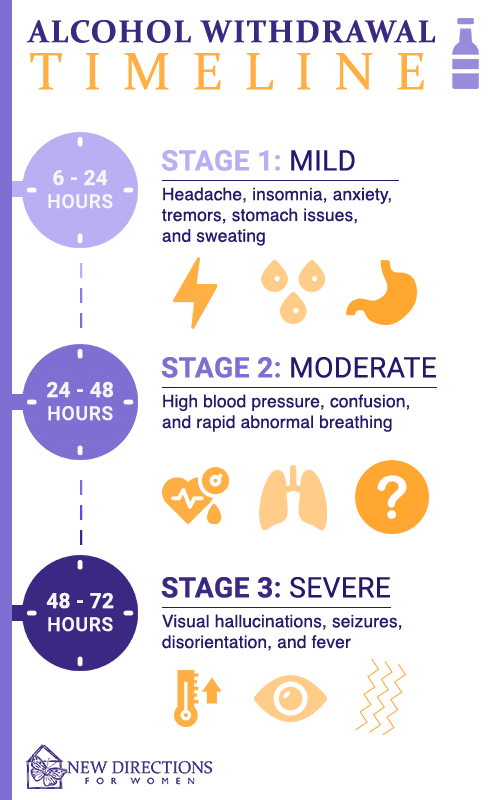Alcohol is a commonly used substance that is known to be very addictive. Chronic overuse of alcohol can lead to physical and emotional dependence. Even though it may have started as a social activity or just a way to wind down, alcohol has the dangerous potential to form a full-blown addiction.
When you become addicted to alcohol, your body will experience intense withdrawal symptoms during the times you are not drinking. Unlike some other addictive substances, alcohol withdrawal can cause serious health problems. Medical detox programs offer a safe and effective way to detox from alcohol while minimizing health complications. Learn more about the alcohol withdrawal timeline.
What Causes Alcohol Withdrawal?
Alcohol dependence and withdrawal is the direct effect of over drinking. The National Institute on Alcohol Abuse and Alcoholism reported that 69.5% of people drank in the past year and that 25.8 % engaged in binge drinking within the past month. Binge drinking has been shown to have a direct connection with developing alcoholism. Regardless of how addiction to alcohol forms, the only way to start the process of recovery is through detox.
The process of detoxification is the initial period of time when the body is filtering out alcoholic substances and toxins. This is also the time where you will experience the symptoms associated with withdrawal. Acute withdrawal symptoms are thought to occur in response to the various changes in brain chemistry. These symptoms are generally understood as intense cravings. A successful detox is crucial for allowing the body to reset its ability to function without it.
Since alcohol is a depressant and sedates the body, those who have engaged in heavy drinking are likely to experience a suppression of neurotransmitters and normal organ function. The production of “feel good” hormones and chemicals no longer occurs naturally, but instead only in response to consuming alcohol. This will result in a difficult period of time when there is difficulty in body function regulation. Producing feel-good hormones decrease while pain and depression may be intensified.
The human brain is smart and always tries to re-balance itself. When you are ingesting substances that fire positive signals, your body will stop firing them on its own. In response, the body tries to tell you that you need to get more of that substance. Alcohol withdrawal symptoms are a combination of internal cravings to drink, and the body’s attempt to go on without drinking.
How Does Alcohol Addiction Affect Women?
Alcoholism is becoming an increasing issue with women. The female body is typically smaller and weighs less than a typical male body would. For the most part, women also tend to have a slower metabolism. The speed and intensity at which alcohol is experienced are very much associated with the digestive system and weight. The combination of a slower metabolism and lower weight causes alcohol to affect women both quicker and more intensely.
Since it takes less alcohol to affect women than men, it’s easier for women to fall into the “binge drinking” level of consumption. Binge drinking for women is considered having 4 drinks within 2 hours. Men need to have six drinks in two hours for it to be considered binge drinking.
Women also report feeling more social pressure to drink. Social events in college and later in life create a feeling of pressure to consume alcohol in order to fit in with peers or minimize social anxiety. The heightened desire to drink combined with a higher susceptibility to addiction makes it riskier for women to engage in heavy drinking.
Women have their own set of health risks that are associated with drinking. Some of these include:
- Infertility
- Liver damage
- Breast cancer
- Fetal alcohol syndrome
- Hormone imbalances
- Weight disorders/body dysmorphia
Although women have a higher risk for alcohol addiction and health risks associated with drinking, they have also been found to be more likely to seek treatment. Women who are experiencing signs or symptoms of alcohol addiction should seek professional detox services to ensure they withdraw and detox in a safe and hospital-level setting.
Alcohol Detox Symptoms of Withdrawal
Alcohol withdrawal symptoms vary from mild to severe. Some of them will persist throughout the entire detox period, while others may only last a few hours or days. The intensity will depend on a lot of things, including:
- Age
- Lifestyle
- Severity of the addiction
- Duration of the addiction
- Pre-existing medical conditions
- General physical and/or mental health
Mild Alcohol Withdrawal Symptoms
While every individual will experience alcohol detox differently, some of the most common mild symptoms include:
- Fever
- Tremors
- Anxiety
- Agitation
- Irritability
- Lack of appetite
- Rapid heart rate
- Profound sweating
- Increased blood pressure
- Severe nausea and/or vomiting
- Sleep disturbances, such as insomnia or intense nightmares
These symptoms, though uncomfortable, do not pose serious health threats. Even if in the moment the pain and discomfort is overwhelming, you can trust that these feelings will pass. Under the supervision of medically trained staff, most people find these symptoms to be relatively manageable without any medical assistance.
Severe Alcohol Withdrawal Symptoms
There are, however, some more serious health concerns that come with alcohol withdrawal. These include:
- Tremors
- Hallucinations
- Withdrawal Seizures
- Delirium Tremens (rapid onset of confusion)
These symptoms pose long-term health conditions and risks, and for this reason, alcohol detox should always be done safely in a clinical setting. Having trained staff with experience in addiction recovery will ensure that any necessary medical intervention is available to you in the event of a health scare.
Alcohol Withdrawal Timeline: Stages
 There are three generally recognized stages to the alcohol withdrawal timeline that can help give you an idea of what to expect. This outline helps medical staff and those going through the process of detox gauge wherein the withdrawal period they are. Having a general understanding of this timeline can help all parties involved have realistic expectations of progress. So, how long does it take to detox from alcohol? The three stages of the alcohol withdrawal timeline include:
There are three generally recognized stages to the alcohol withdrawal timeline that can help give you an idea of what to expect. This outline helps medical staff and those going through the process of detox gauge wherein the withdrawal period they are. Having a general understanding of this timeline can help all parties involved have realistic expectations of progress. So, how long does it take to detox from alcohol? The three stages of the alcohol withdrawal timeline include:
Stage 1 (mild, 6-24 hours after last drink): symptoms experienced include headache, insomnia, anxiety, tremors, stomach issues, and sweating
Stage 2 (moderate, 24-48 hours after last drink): symptoms include those of stage one as well as high blood pressure, confusion, and rapid abnormal breathing.
Stage 3 (severe, 48-72 hours after last drink): symptoms include Stage 2 symptoms as well as visual hallucinations, seizures, disorientation, and fever.
This is a general timeline, but symptoms and severity will vary from person to person. Medical professionals will be able to monitor what stage you are at based on symptoms, vitals, and behavior. Specialized treatments offered in detox centers will be able to mitigate health risks as they arise.
How Long Will Alcohol Withdrawal Symptoms Last?
The average length of withdrawal symptoms is five days. Symptoms can persist up to a week, but most detox programs cap at 7 days. If you feel you haven’t made appropriate progress or that your detox period needs to be extended, talking with your detox staff will help determine next steps. Extended withdrawal symptoms may be a result of the severity of the addiction, mental health conditions, or other pre-existing health concerns.
Post-Acute Withdrawal Syndrome (PAWS)
In some rare cases, withdrawal symptoms can persist even when the detox period has ended. This extended phase, most commonly referred to as PAWS, can last anywhere from a few weeks to a year. In typical detox cases, physical withdrawals will subside after detox even if emotional cravings persist. A completed detox should signal to the body that it does not need alcohol to function. In the event of Post Acute Withdrawal Syndrome, individuals experience intense physical cravings and symptoms for an extended period of time. The body does not adjust correctly to the lack of alcohol, resulting in prolonged symptoms. Therapy, support groups, and in some cases medication can help mitigate symptoms.
What Happens After Alcohol Detox?
 Detox is only the foundation to sobriety. Treatment should not end just because alcohol is no longer in your system. Once you have successfully finished a full alcohol detox program, it’s important to enroll in a long-term treatment program. Most facilities will offer both inpatient residential programs and outpatient programs so you can find a program that suits your needs and lifestyle.
Detox is only the foundation to sobriety. Treatment should not end just because alcohol is no longer in your system. Once you have successfully finished a full alcohol detox program, it’s important to enroll in a long-term treatment program. Most facilities will offer both inpatient residential programs and outpatient programs so you can find a program that suits your needs and lifestyle.
New Directions for women offers long-term treatment programs for women where they can be immersed in sober living with other like-minded women and continue to grow on the journey to sobriety. Our long-term programs offer various types of treatment such as one-on-one therapy, group therapy, nutritional therapy, life skills, holistic treatments, meditation, and more.
Alcohol Detox at New Directions for Women
New Directions for Women welcomes all women seeking a detox program for alcohol addiction. We keep the special needs of women in mind when building our programs and developing our environment. Our programs are built to give you a strong foundation for your sobriety with extended resources for staying alcohol-free for life. Our medically trained staff brings an extensive background in alcohol and substance abuse treatment, as well as passion and care for helping women overcome addiction. For more information, contact us anytime!












